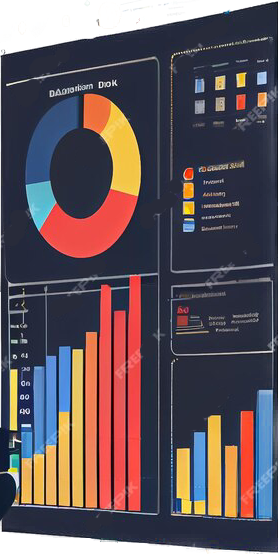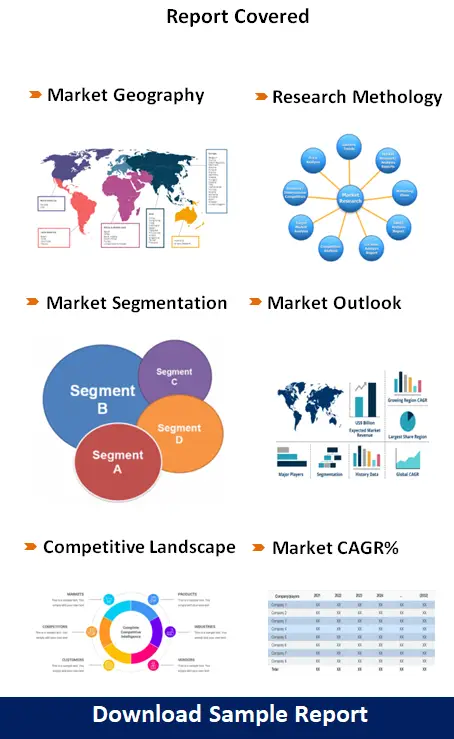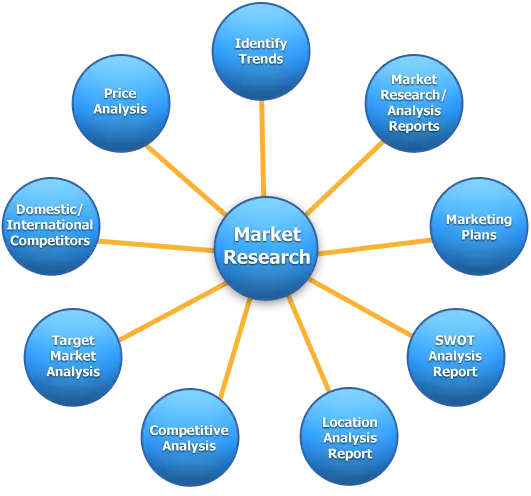Language Learning Application Market Growth CAGR Overview
According to research by Infinitive Data Research, the global Language Learning Application Market size was valued at USD 11.6 Bln (billion) in 2024 and is Calculated to reach USD 16.6 Bln (billion) by the end of 2032, growing at an anticipated compound annual growth rate (CAGR) of 7.3% during the forecast period 2024 to 2032. This projected growth is driven by its increasing adoption across Software & Services industries such as Institutional Learners, Individual LearnersThe language learning app space is evolving super fast, blending cutting-edge AI with interactive content to keep users engaged on the daily. Companies are hustling to upgrade their platforms with gamified experiences, live tutor sessions, and adaptive learning curves that vibe with diverse learner needs. There’s also a strong push towards integrating AR/VR features, making the learning process feel more immersive and personalized than ever before. This dynamic scene is fueled by a global appetite for cultural exchange and digital transformation, meaning that even the smallest startups can disrupt traditional models with fresh tech and bold ideas.
Competition is heating up as both established tech giants and nimble startups battle for attention, prompting rapid innovation in product design and user interface. The market is marked by a fluid interplay between high-tech development and accessibility, ensuring that language learning apps remain on point for users from all walks of life. With the increasing need for remote learning and international communication, these platforms are riding a wave of sustained interest and evolving consumer preferences. Every update and feature drop is carefully calibrated to enhance retention and engagement, keeping the entire ecosystem buzzing with fresh energy.
Digital transformation is the name of the game, with new partnerships and collaborations across education, tech, and media sectors. Investors are pouring capital into ventures that promise scalability and a fresh approach to language acquisition, recognizing the shifting habits of millennials and Gen Z alike. The interplay between subscription models and freemium offerings is also reshaping revenue strategies, allowing companies to diversify their income streams. In this rapidly shifting landscape, adaptability and innovative content remain the keys to standing out.
The rise of social media and influencer culture is also impacting market dynamics, as word-of-mouth and viral content become powerful tools for app promotion. Companies are leveraging user-generated content and community engagement to drive organic growth and brand loyalty. This cultural integration, coupled with the constant evolution of technology, ensures that the market remains vibrant, competitive, and endlessly creative, ready to meet the ever-changing needs of global language learners.
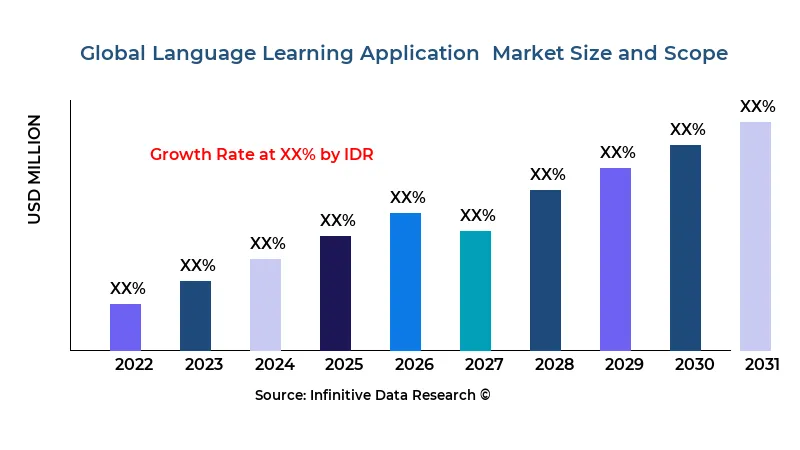
>>> Understand The Key Trends Shaping This Market:- Download PDF Sample
Language Learning Application Market Growth Factors
Growth in the language learning market is driven by an increased demand for digital education tools, particularly as remote work and online learning become the norm worldwide. With millennials and Gen Z at the forefront of tech adoption, these platforms are uniquely positioned to capitalize on their desire for self-improvement and global connectivity. Investment in AI-driven personalization is a major catalyst, as platforms evolve to deliver customized learning experiences that keep users hooked for the long haul.
There’s also an undeniable social element to language learning apps—users aren’t just learning a language; they’re joining communities and connecting across cultures. This sense of global belonging is amplified by interactive features like live chats, community challenges, and peer feedback systems, which all contribute to robust user engagement and retention. As users demand more immersive and authentic experiences, companies are stepping up with innovative content and cross-platform integrations that blur the line between education and entertainment.
Expanding internet accessibility and smartphone penetration in emerging markets are further propelling the growth of these apps, opening up new user bases and untapped regions. The rising importance of multilingualism in global business, travel, and social interaction fuels demand even more, with institutions and private enterprises alike investing in language training for employees. This broad-based interest ensures that the market is not just surviving but thriving as the digital era reshapes learning habits.
Finally, regulatory support and public-private partnerships in many countries are helping to foster a robust ecosystem for language education innovation. As governments and educational bodies collaborate with tech companies, the resulting synergy paves the way for funding opportunities, pilot programs, and scalable models that benefit both learners and providers. This multi-layered growth strategy sets the stage for sustained momentum and transformative advancements in language learning technology.
Market Analysis By Competitors
- Duolingo
- Babbel
- Rosetta Stone
- Memrise
- Busuu
- LinguaLeo
- Koolearn (NEW Oriental)
- Edmodo (Netdragon)
- Wall Street English
- Open English
- Italki
- Voxy
- Mango Languages
- Drops
- Lingvist
By Product Type
- English
- World Languages
By Application
- Institutional Learners
- Individual Learners
>>> Understand The Key Trends Shaping This Market:- Understand The Key Trends Shaping This Market:-
Language Learning Application Market Segment Analysis
Distribution Channel:
Language learning apps dominate digital distribution channels, primarily through app stores, online subscriptions, and integrated platforms within educational ecosystems. The direct-to-consumer model is booming, bolstered by partnerships with telecom and tech giants who bundle these apps into broader digital service packages. This seamless digital distribution maximizes reach and lowers customer acquisition costs while ensuring that content updates and user feedback loops remain agile and responsive to market trends.
Compatibility:
These applications are designed to be ultra-compatible with various operating systems, including iOS, Android, and even web-based platforms, making them accessible on smartphones, tablets, and desktops. Developers prioritize cross-platform consistency to ensure that users enjoy the same interactive, high-quality experience regardless of their device. This focus on universal compatibility is also paired with smart integration into wearable devices and emerging AR/VR tech, broadening the horizon for interactive learning experiences and immersive engagement.
Price Range:
The market features a wide range of pricing strategies, from freemium models with in-app purchases to subscription-based plans that offer premium features and personalized coaching. Companies are experimenting with tiered pricing to cater to both casual learners and those seeking intensive, professional-level language training. This flexible pricing structure helps drive adoption across diverse demographics, ensuring that learners with varying budgets can access the tools they need without breaking the bank, while still offering value-added services for power users.
Product Type:
Language learning apps span a spectrum of product types, from gamified learning experiences and vocabulary builders to comprehensive platforms that include live tutoring, cultural immersion modules, and interactive community forums. Some products focus on quick, bite-sized lessons designed for busy lifestyles, while others offer in-depth courses with structured curriculums. This diversity in product offerings allows companies to target niche markets as well as mainstream consumers, making the overall market a rich ecosystem of innovation and competitive differentiation.
| REPORT ATTRIBUTES | DETAILS |
|---|---|
| Study Period |
2019-2032 |
| Base Year |
2023 |
| Forecast Period |
2024-2032 |
| Historical Period |
2019-2022 |
| Unit |
Value (USD Billion) |
| Key Companies Profiled |
Duolingo, Babbel, Rosetta Stone, Memrise, Busuu, LinguaLeo, Koolearn (NEW Oriental), Edmodo (Netdragon), Wall Street English, Open English, Italki, Voxy, Mango Languages, Drops, Lingvist |
| Segments Covered |
By Product |
| Customization Scope |
Free report customization (equivalent to up to 3 analyst working days) with purchase. Addition or alteration to country, regional and segment scope |
>>> Overview of Market Analysis:- Download PDF Sample
Language Learning Application Market Regional Analysis
The North American market remains one of the largest segments for language learning applications, fueled by high smartphone penetration, advanced digital infrastructure, and a strong cultural emphasis on global connectivity. In this region, consumers are quick to adopt new technologies, and there is a robust ecosystem of investors, developers, and educational institutions driving constant innovation and market expansion. The region’s focus on remote learning and continuous professional development further fuels demand, creating a mature yet dynamic market landscape.
In Europe, the market is characterized by diverse linguistic landscapes and strong governmental support for multilingual education, which drives steady demand for digital language tools. The continent’s rich cultural history of language learning is being modernized through technology, with companies focusing on localized content and adaptive learning strategies. This regional dynamic is underscored by cross-border collaborations and research initiatives that enhance the overall quality and relevance of language learning apps, ensuring they remain competitive and culturally resonant.
Asia Pacific is experiencing rapid growth in the language learning segment, largely due to its burgeoning middle class, increasing emphasis on global business, and widespread adoption of digital technologies. Emerging markets within the region are seeing exponential increases in mobile internet penetration, which opens up significant opportunities for app developers. This region is marked by fierce competition as local players innovate quickly to cater to unique regional needs, blending traditional learning methods with state-of-the-art digital solutions to create hybrid educational experiences.
Latin America and the Middle East are also catching up, with growing investments in digital education and a keen interest in multilingualism spurred by globalization. These regions benefit from governmental initiatives aimed at boosting education standards and enhancing international communication skills among the youth. As local economies grow and digital infrastructure improves, language learning applications are positioned to capture increasing market share, making these regions some of the most promising areas for future expansion and innovation.
global Language Learning Application market revenue (usd million) comparison by players 2024-2032
| Company/players | 2021 | 2022 | 2023 | 2024 | ... | (2032) |
|---|---|---|---|---|---|---|
| Duolingo | XX | XX | XX | XX | XX | XX |
| Babbel | XX | XX | XX | XX | XX | XX |
| Rosetta Stone | XX | XX | XX | XX | XX | XX |
| Memrise | XX | XX | XX | XX | XX | XX |
| Busuu | XX | XX | XX | XX | XX | XX |
| LinguaLeo | XX | XX | XX | XX | XX | XX |
| Koolearn (NEW Oriental) | XX | XX | XX | XX | XX | XX |
| Edmodo (Netdragon) | XX | XX | XX | XX | XX | XX |
| Wall Street English | XX | XX | XX | XX | XX | XX |
| Open English | XX | XX | XX | XX | XX | XX |
| Italki | XX | XX | XX | XX | XX | XX |
| Voxy | XX | XX | XX | XX | XX | XX |
| Mango Languages | XX | XX | XX | XX | XX | XX |
| Drops | XX | XX | XX | XX | XX | XX |
| Lingvist | XX | XX | XX | XX | XX | XX |
| Total | XX | XX | XX | XX | XX | XX |
global Language Learning Application market revenue (usd million) comparison by product type 2024-2032
Product Type
2023
2024
...
2032
CAGR%(2024-32)
English
XX
XX
XX
XX
XX
World Languages
XX
XX
XX
XX
XX
Total
XX
XX
XX
XX
XX
| Product Type | 2023 | 2024 | ... | 2032 | CAGR%(2024-32) |
|---|---|---|---|---|---|
| English | XX | XX | XX | XX | XX |
| World Languages | XX | XX | XX | XX | XX |
| Total | XX | XX | XX | XX | XX |
global Language Learning Application market revenue (usd million) comparison by application 2024-2032
Application
2023
2024
...
2032
CAGR%(2024-32)
Institutional Learners
XX
XX
XX
XX
XX
Individual Learners
XX
XX
XX
XX
XX
Total
XX
XX
XX
XX
XX
| Application | 2023 | 2024 | ... | 2032 | CAGR%(2024-32) |
|---|---|---|---|---|---|
| Institutional Learners | XX | XX | XX | XX | XX |
| Individual Learners | XX | XX | XX | XX | XX |
| Total | XX | XX | XX | XX | XX |
>>> Market Understand Through Graph And Chart:- Download PDF Sample
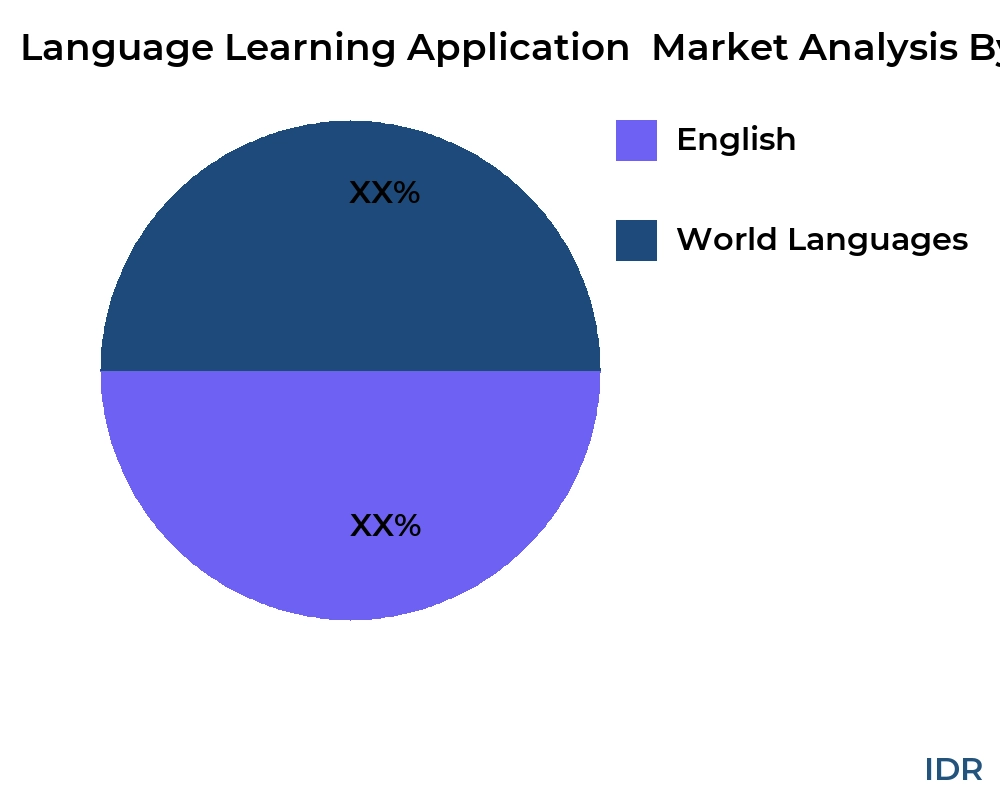
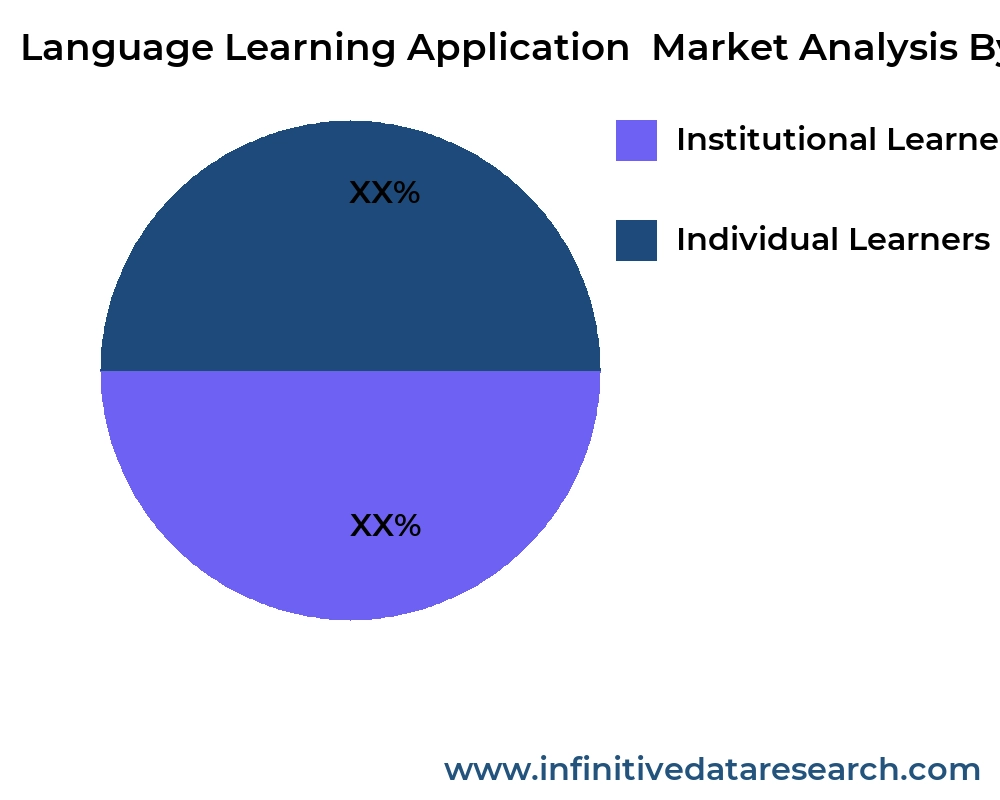
Language Learning Application Market Competitive Insights
The competitive landscape in the language learning app market is intensely dynamic, with well-established players and disruptive startups coexisting in a high-energy environment. Traditional industry leaders are leveraging their brand recognition and extensive resources to continuously update and refine their platforms, while nimble newcomers are attracting users with innovative features and fresh design aesthetics. The intense competition drives rapid product evolution and forces all players to stay ahead of tech trends and user expectations.
Investors are pouring major capital into promising ventures, and this financial backing is accelerating the pace of innovation across the board. Competitive strategies are increasingly centered around strategic partnerships, data-driven personalization, and user-centric design. The market’s openness to experimentation and rapid adoption of emerging technologies ensures that companies are constantly pushing the envelope on what digital language learning can achieve. As a result, market leaders are not just competing on price but also on the depth of educational content and technological sophistication.
Moreover, the shift towards subscription models and recurring revenue streams is reshaping competitive tactics, prompting companies to focus on long-term user engagement rather than one-off transactions. This change has led to an emphasis on comprehensive service ecosystems that combine education, entertainment, and social networking. In turn, competitors are investing in community building and customer service excellence to create loyal user bases that are less price-sensitive and more appreciative of value-added content and interactive features.
The constant innovation cycle means that strategic alliances and mergers are becoming common, as companies look to consolidate expertise and scale their operations more efficiently. In this environment, companies that can quickly adapt to new technological paradigms and shifting consumer behaviors are the ones most likely to lead the market. The overall competitive scene is a blend of strategic risk-taking, rapid iteration, and a relentless focus on delivering the best possible learning experience to users across the globe.
Language Learning Application Market Competitors
USA:
- LinguaTech Inc.
- Polyglot Dynamics
- SpeakEasy Labs
- FluentGen Solutions
- LexiLearn Innovations
Germany:
- SprachMeister GmbH
- LinguaNova AG
- VerbumTech Solutions
- PolyLingua Systems
- WissenWave GmbH
Japan:
- Nihongo Nexus Corp.
- LinguaZen Innovations
- SpeakSmart Japan
- BabelBridge Technologies
- Lexicon Dynamics
China:
- SinoLingo Tech
- Mandarin Mastery Inc.
- SpeakEasy China
- Polyglot Panda Solutions
- LinguaRise Ltd.
UK:
- BritLingo Systems
- FluentEdge Innovations
- SpeakUp UK
- LanguageLink Ltd.
- VerbalVibe Tech
France:
- ParlezPlus Technologies
- LinguaLuxe
- BabelBeat Solutions
- FluencyForge
- MotsMagiques Corp.
Language Learning Application Market Top Competitors
1. LinguaTech Inc.
LinguaTech Inc. is a market leader known for its state-of-the-art AI-driven language modules that are constantly updated to match global learning trends. They maintain a robust subscription base and have a presence in multiple countries. Their platform emphasizes interactive learning through gamification and real-time feedback. They consistently invest in R&D, keeping them ahead of the competition. Their strategic partnerships with educational institutions further solidify their market dominance.
2. Polyglot Dynamics
Polyglot Dynamics has emerged as a disruptive force with its innovative approach to blending social media and language education. The company is known for its agile development team and frequent feature updates. Their subscription model attracts a young, tech-savvy audience who value community-driven learning. They have successfully expanded their footprint in emerging markets. Their dynamic product strategy keeps them relevant in a rapidly shifting digital ecosystem.
3. SpeakEasy Labs
SpeakEasy Labs focuses on personalized learning experiences, using data analytics to tailor lessons to individual user needs. They have built a reputation for robust customer support and interactive tutorials. The company’s platform is both user-friendly and highly adaptable to new educational trends. Their strategic emphasis on mobile-first solutions makes them a favorite among younger audiences. They continue to innovate through frequent software updates and collaborations.
4. FluentGen Solutions
FluentGen Solutions stands out by offering comprehensive learning modules that integrate live tutoring and community interaction. Their platform is known for high-quality content curated by language experts. They have a broad international user base, thanks to strategic localizations and culturally relevant content. The company places a high value on technological innovation and continuous improvement. Their commitment to user-centric design has earned them a loyal customer following.
5. LexiLearn Innovations
LexiLearn Innovations has positioned itself as a premium provider in the language learning sector with a focus on immersive, interactive experiences. Their product suite includes AR/VR components that simulate real-life conversations. The company prides itself on being at the forefront of educational technology trends. They maintain a strong presence in both established and emerging markets. Their forward-thinking approach keeps them competitive and in demand.
6. SprachMeister GmbH
SprachMeister GmbH is a key player in the European market, celebrated for its robust and comprehensive language learning ecosystem. Their platform is highly adaptive, integrating cutting-edge technology with traditional pedagogical methods. The company is backed by strong academic partnerships and a deep focus on research. Their products are designed to address the diverse needs of multilingual audiences. Their market position is bolstered by continuous innovation and customer trust.
7. LinguaNova AG
LinguaNova AG has built a strong reputation in Europe for blending classic language learning methods with modern tech solutions. They are known for offering a wide array of language courses, each tailored to different proficiency levels. Their strategy revolves around continuous content updates and customer engagement initiatives. They maintain a loyal user base through a mix of free and premium content. Their innovative approach ensures they stay competitive in a saturated market.
8. VerbumTech Solutions
VerbumTech Solutions is recognized for its data-driven approach to language education, leveraging analytics to refine learning outcomes. Their platform is widely appreciated for its intuitive design and seamless user experience. They have established significant market presence through strategic B2B collaborations. Their product evolution is guided by strong feedback loops from users. This agility has earned them a solid position among industry frontrunners.
9. PolyLingua Systems
PolyLingua Systems offers a versatile and adaptive learning platform that resonates with users across Europe and beyond. They focus on creating immersive, interactive experiences that blend digital and real-world learning. The company emphasizes continuous improvement through user feedback and technological upgrades. Their market strategy is centered around affordability combined with quality. Their sustained innovation has made them a respected competitor in the industry.
10. WissenWave GmbH
WissenWave GmbH is a rising star in the language learning market, known for its innovative curriculum and adaptive technology. Their approach integrates social learning elements with personalized education paths. They benefit from strong partnerships with cultural institutions and academic bodies. Their platform is celebrated for its engaging, user-friendly interface. Continuous investment in tech upgrades ensures they remain a competitive force in the evolving market.
The report provides a detailed analysis of the Language Learning Application market across various regions, highlighting the unique market dynamics and growth opportunities in each region.
- US
- Canada
- Mexico
- UK
- Germany
- France
- Italy
- Russia
- Spain
- Switzerland
- Austria
- Belgium
- Rest of Europe
- China
- Japan
- South Korea
- Indonesia
- Vietnam
- Philippines
- Australia
- Thailand
- Singapore
- Rest of APAC
- UAE
- Saudi Arabia
- Egypt
- South Africa
- Israel
- Rest of MEA
- Brazil
- Argentina
- Rest of Latin America
>>> Need A Different Region Or Segment? Download PDF Sample
Key Takeaways
- The global Language Learning Application market is expected to grow significantly from 2024 to 2032, driven by technological advancements, increasing demand, and government investments in urbanization.
- The market is characterized by a diverse range of manufacturers, product types, and applications, catering to different consumer needs and preferences.
- Regional insights highlight the unique market dynamics and growth opportunities in various regions, including North America, Europe, Asia-Pacific, Latin America, and the Middle East & Africa.
- The competitive landscape features key players who have created a dynamic and diverse market environment through collaborations, mergers and acquisitions, and innovative product developments.
- Market trends such as technological advancements, sustainability, customization, and digital transformation are shaping the growth and development of the Language Learning Application market.
- Despite the positive outlook, the market faces challenges such as regulatory compliance, high initial investment costs, and economic uncertainties.
- The report provides comprehensive coverage of market size, market share, growth factors, and strategic insights to help businesses navigate the dynamic Language Learning Application market and achieve long-term success.
By leveraging the information provided in this report, businesses can develop effective strategies, address market challenges, and capitalize on growth opportunities to ensure sustainable growth and long-term success in the global Language Learning Application market.
- Introduction
- Objectives of the Study
- Market Definition
- Research Scope
- Currency
- Key Target Audience
- Research Methodology and Assumptions
- Executive Summary
- Premium Insights
- Porter’s Five Forces Analysis
- Value Chain Analysis
- Top Investment Pockets
- Industry Trends
- Market Dynamics
- Market Evaluation
- Drivers
- Restraints
- Opportunities
- Challenges
- Global Language Learning Application Market Analysis and Projection, By Companies
- Segment Overview
- Duolingo
- Babbel
- Rosetta Stone
- Memrise
- Busuu
- LinguaLeo
- Koolearn (NEW Oriental)
- Edmodo (Netdragon)
- Wall Street English
- Open English
- Italki
- Voxy
- Mango Languages
- Drops
- Lingvist
- Global Language Learning Application Market Analysis and Projection, By Type
- Segment Overview
- English
- World Languages
- Global Language Learning Application Market Analysis and Projection, By Application
- Segment Overview
- Institutional Learners
- Individual Learners
- Global Language Learning Application Market Analysis and Projection, By Regional Analysis
- North America
- US
- Canada
- Mexico
- Europe
- UK
- Germany
- France
- Italy
- Russia
- Spain
- Switzerland
- Austria
- Belgium
- Rest of Europe
- Asia Pacific
- China
- Japan
- South Korea
- Indonesia
- Vietnam
- Philippines
- Australia
- Thailand
- Singapore
- Rest of APAC
- Middle East
- UAE
- Saudi Arabia
- Egypt
- South Africa
- Israel
- Rest of MEA
- Latin America
- Brazil
- Argentina
- Rest of Latin America
- Global Language Learning Application Market-Competitive Landscape
- Overview
- Market Share of Key Players in the Language Learning Application Market
- Global Company Market Share
- North America Company Market Share
- Europe Company Market Share
- APAC Company Market Share
- Competitive Situations and Trends
- Coverage Launches and Developments
- Partnerships, Collaborations, and Agreements
- Mergers & Acquisitions
- Expansions
- Company Profiles
- Duolingo
- Business Overview
- Company Snapshot
- Company Market Share Analysis
- Company Coverage Portfolio
- Recent Developments
- SWOT Analysis
- Babbel
- Business Overview
- Company Snapshot
- Company Market Share Analysis
- Company Coverage Portfolio
- Recent Developments
- SWOT Analysis
- Rosetta Stone
- Business Overview
- Company Snapshot
- Company Market Share Analysis
- Company Coverage Portfolio
- Recent Developments
- SWOT Analysis
- Memrise
- Business Overview
- Company Snapshot
- Company Market Share Analysis
- Company Coverage Portfolio
- Recent Developments
- SWOT Analysis
- Busuu
- Business Overview
- Company Snapshot
- Company Market Share Analysis
- Company Coverage Portfolio
- Recent Developments
- SWOT Analysis
- LinguaLeo
- Business Overview
- Company Snapshot
- Company Market Share Analysis
- Company Coverage Portfolio
- Recent Developments
- SWOT Analysis
- Koolearn (NEW Oriental)
- Business Overview
- Company Snapshot
- Company Market Share Analysis
- Company Coverage Portfolio
- Recent Developments
- SWOT Analysis
- Edmodo (Netdragon)
- Business Overview
- Company Snapshot
- Company Market Share Analysis
- Company Coverage Portfolio
- Recent Developments
- SWOT Analysis
- Wall Street English
- Business Overview
- Company Snapshot
- Company Market Share Analysis
- Company Coverage Portfolio
- Recent Developments
- SWOT Analysis
- Open English
- Business Overview
- Company Snapshot
- Company Market Share Analysis
- Company Coverage Portfolio
- Recent Developments
- SWOT Analysis
- Italki
- Business Overview
- Company Snapshot
- Company Market Share Analysis
- Company Coverage Portfolio
- Recent Developments
- SWOT Analysis
- Voxy
- Business Overview
- Company Snapshot
- Company Market Share Analysis
- Company Coverage Portfolio
- Recent Developments
- SWOT Analysis
- Mango Languages
- Business Overview
- Company Snapshot
- Company Market Share Analysis
- Company Coverage Portfolio
- Recent Developments
- SWOT Analysis
- Drops
- Business Overview
- Company Snapshot
- Company Market Share Analysis
- Company Coverage Portfolio
- Recent Developments
- SWOT Analysis
- Lingvist
- Business Overview
- Company Snapshot
- Company Market Share Analysis
- Company Coverage Portfolio
- Recent Developments
- SWOT Analysis
List of Table
- Drivers of Global Language Learning Application Market: Impact Analysis
- Restraints of Global Language Learning Application Market: Impact Analysis
- Global Language Learning Application Market, By Technology, 2023-2032(USD Billion)
- global English, Language Learning Application Market, By Region, 2023-2032(USD Billion)
- global World Languages, Language Learning Application Market, By Region, 2023-2032(USD Billion)
- global Institutional Learners, Language Learning Application Market, By Region, 2023-2032(USD Billion)
- global Individual Learners, Language Learning Application Market, By Region, 2023-2032(USD Billion)
List of Figures
- Global Language Learning Application Market Segmentation
- Language Learning Application Market: Research Methodology
- Market Size Estimation Methodology: Bottom-Up Approach
- Market Size Estimation Methodology: Top-down Approach
- Data Triangulation
- Porter’s Five Forces Analysis
- Value Chain Analysis
- Top investment pocket in the Language Learning Application Market
- Top Winning Strategies, 2023-2032
- Top Winning Strategies, By Development, 2023-2032(%)
- Top Winning Strategies, By Company, 2023-2032
- Moderate Bargaining power of Buyers
- Moderate Bargaining power of Suppliers
- Moderate Bargaining power of New Entrants
- Low threat of Substitution
- High Competitive Rivalry
- Restraint and Drivers: Language Learning Application Market
- Language Learning Application Market Segmentation, By Technology
- Language Learning Application Market For Live Attenuated, By Region, 2023-2033 ($ Billion)
- Global Language Learning Application Market, By Technology, 2023-2032(USD Billion)
- global English, Language Learning Application Market, By Region, 2023-2032(USD Billion)
- global World Languages, Language Learning Application Market, By Region, 2023-2032(USD Billion)
- global Institutional Learners, Language Learning Application Market, By Region, 2023-2032(USD Billion)
- global Individual Learners, Language Learning Application Market, By Region, 2023-2032(USD Billion)
- Duolingo: Net Sales, 2023-2033 ($ Billion)
- Duolingo: Revenue Share, By Segment, 2023 (%)
- Duolingo: Revenue Share, By Region, 2023 (%)
- Babbel: Net Sales, 2023-2033 ($ Billion)
- Babbel: Revenue Share, By Segment, 2023 (%)
- Babbel: Revenue Share, By Region, 2023 (%)
- Rosetta Stone: Net Sales, 2023-2033 ($ Billion)
- Rosetta Stone: Revenue Share, By Segment, 2023 (%)
- Rosetta Stone: Revenue Share, By Region, 2023 (%)
- Memrise: Net Sales, 2023-2033 ($ Billion)
- Memrise: Revenue Share, By Segment, 2023 (%)
- Memrise: Revenue Share, By Region, 2023 (%)
- Busuu: Net Sales, 2023-2033 ($ Billion)
- Busuu: Revenue Share, By Segment, 2023 (%)
- Busuu: Revenue Share, By Region, 2023 (%)
- LinguaLeo: Net Sales, 2023-2033 ($ Billion)
- LinguaLeo: Revenue Share, By Segment, 2023 (%)
- LinguaLeo: Revenue Share, By Region, 2023 (%)
- Koolearn (NEW Oriental): Net Sales, 2023-2033 ($ Billion)
- Koolearn (NEW Oriental): Revenue Share, By Segment, 2023 (%)
- Koolearn (NEW Oriental): Revenue Share, By Region, 2023 (%)
- Edmodo (Netdragon): Net Sales, 2023-2033 ($ Billion)
- Edmodo (Netdragon): Revenue Share, By Segment, 2023 (%)
- Edmodo (Netdragon): Revenue Share, By Region, 2023 (%)
- Wall Street English: Net Sales, 2023-2033 ($ Billion)
- Wall Street English: Revenue Share, By Segment, 2023 (%)
- Wall Street English: Revenue Share, By Region, 2023 (%)
- Open English: Net Sales, 2023-2033 ($ Billion)
- Open English: Revenue Share, By Segment, 2023 (%)
- Open English: Revenue Share, By Region, 2023 (%)
- Italki: Net Sales, 2023-2033 ($ Billion)
- Italki: Revenue Share, By Segment, 2023 (%)
- Italki: Revenue Share, By Region, 2023 (%)
- Voxy: Net Sales, 2023-2033 ($ Billion)
- Voxy: Revenue Share, By Segment, 2023 (%)
- Voxy: Revenue Share, By Region, 2023 (%)
- Mango Languages: Net Sales, 2023-2033 ($ Billion)
- Mango Languages: Revenue Share, By Segment, 2023 (%)
- Mango Languages: Revenue Share, By Region, 2023 (%)
- Drops: Net Sales, 2023-2033 ($ Billion)
- Drops: Revenue Share, By Segment, 2023 (%)
- Drops: Revenue Share, By Region, 2023 (%)
- Lingvist: Net Sales, 2023-2033 ($ Billion)
- Lingvist: Revenue Share, By Segment, 2023 (%)
- Lingvist: Revenue Share, By Region, 2023 (%)
Infinitive Data Research provides comprehensive market research, offering in-depth market analysis to help companies understand their target market and industry competition. This research predicts the market acceptance of your brand and products, ensuring informed decision-making for business success.
Competitor Analysis in the Language Learning Application Industry
Conducting a competitor analysis involves identifying competitors within the Language Learning Application industry and studying their various marketing strategies. This comparative data allows you to assess your company's strengths and weaknesses relative to competitors, providing insights to enhance your market position.
Importance of Continuous Market Research
Consistently conducting market research is essential for minimizing risk at every stage of business operations. Language Learning Application market research enables you to collect qualitative and quantitative data, which, when properly analyzed, leads to wise decisions that align with user and customer needs. Below are some crucial lessons learned through the Language Learning Application market research process:

Key Dimensions of Language Learning Application Market Analysis
- Trend and Pattern Identification: Analyzing data to spot market trends and patterns.
- Pricing Analysis: Assessing keyword pricing strategies.
- Actionable Insights: Implementing insights derived from data analysis.
- Market Potential: Evaluating the potential of the Language Learning Application market.
- Competitor Analysis: Studying competitors' strategies and performance.
- Location Analysis: Assessing optimal locations for market penetration.
- Distribution Channels Analysis: Evaluating the effectiveness of distribution channels.
- Market Size and Growth Rate: Measuring market size and growth potential.
- Market Profitability: Assessing profitability prospects.
- Key Success Factors: Identifying critical factors for success.
- Cost Structure: Understanding the cost structure within the Language Learning Application industry.
Target Audience for the Report
This report is valuable for a diverse audience, including:
- Language Learning Application Market Manufacturers: To understand market dynamics and enhance production strategies.
- Investors and Financing Companies: To assess investment opportunities and risks.
- Language Learning Application Market Suppliers: To identify market demands and supply chain efficiencies.
Necessity of the Report
Making Crucial Business Decisions
Understanding the Language Learning Application market, competition, and industry landscape is vital for making informed business decisions. Without current and relevant market research, decisions may be based on outdated or irrelevant information, potentially harming the business.
Securing Investment Funds
Attracting investors requires demonstrating thorough market research. Investors need assurance that you understand the sector, current and potential competition, and whether your idea addresses a market need.
Identifying New Business Opportunities
Language Learning Application market research goes beyond understanding trends and consumer behavior. It identifies new revenue streams and opportunities for business pivots. These insights can lead to strategic changes in the business model, promoting growth and adapting to market challenges.
Avoiding Business Failures
Market research also plays a crucial role in risk mitigation. It can reveal when not to pursue certain actions, saving the company from potential losses in revenue, brand image, and more. This proactive approach is often overlooked but is essential for long-term success.
Conclusion
Infinitive Data Research's comprehensive Language Learning Application market research provides critical insights for making solid business decisions, securing investments, identifying new opportunities, and avoiding potential failures. Understanding market dynamics through continuous research ensures your company remains competitive and thrives in the Language Learning Application industry.

